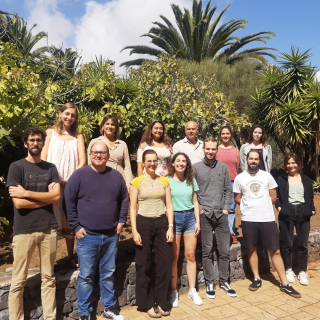Bibcode
Barro, G.; Pérez-González, P. G.; Villar, V.; Trujillo, I.; Mármol-Queraltó, E.
Referencia bibliográfica
Monthly Notices of the Royal Astronomical Society, Volume 429, Issue 1, p.792-798
Fecha de publicación:
2
2013
Número de citas
15
Número de citas referidas
10
Descripción
The accretion of minor satellites is currently proposed as the most
likely mechanism to explain the significant size evolution of the
massive galaxies during the last ˜10 Gyr. In this paper, we
investigate the rest-frame colours and the average stellar ages of
satellites found around massive galaxies (Mstar ˜
1011 M&sun;) since z ˜ 2. We find that the
satellites have bluer colours than their central galaxies. When
exploring the stellar ages of the galaxies, we find that the satellites
have similar ages to the massive galaxies that host them at high
redshifts, while at lower redshifts they are, on average, ≳1.5 Gyr
younger. If our satellite galaxies create the envelope of nearby massive
galaxies, our results would be compatible with the idea that the
outskirts of those galaxies are slightly younger, metal-poorer and with
lower [α/Fe] abundance ratios than their inner regions.
Proyectos relacionados

Huellas de la Formación de las Galaxias: Poblaciones estelares, Dinámica y Morfología
Bienvenida a la página web del g rupo de investigación Traces of Galaxy Formation. Somos un grupo de investigación amplio, diverso y muy activo cuyo objetivo principal es entender la formación de galaxias en el Universo de una manera lo más completa posible. Con el estudio detellado de las poblaciones estelares como bandera, estamos constantemente
Anna
Ferré Mateu